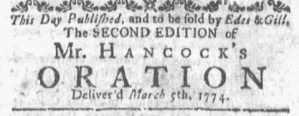What was advertised in a colonial American newspaper 250 years ago today?

“The SECOND EDITION of Mr. HANCOCK’S ORATION.”
Benjamin Edes and John Gill, printers of the Boston-Gazette, gave their advertisement for the “SECOND EDITION of Mr. HANCOCK’S ORATION Deliver’d March 5th” a privileged place in their newspaper. Readers did not need further explanation to understand that “March 5th” referred to the date of the Boston Massacre and that Hancock had been selected to give the annual address that memorialized the victims and raised an alarm about the danger of quartering an army in an urban center, like Boston, during times of peace.
Still, Edes and Gill, who printed the “ORATION” as well as the newspaper, did what they could to draw attention to the second edition. The first time they announced it was “This Day Published,” in the April 4, 1774, edition of the Boston-Gazette, they ran the notice immediately below news and editorials. Even if readers chose not to peruse other advertisements closely once they realized they had finished the news, they likely took note of the advertisement for the “ORATION” in its place of transition from one kind of content to another. In the next issue of the weekly newspaper, the notice ran at the bottom of the last column on the first page, the only advertisement on that page. Once again, the patriot printers increased the likelihood that readers would spot that advertisement and accept an invitation to demonstrate their own commitment to the patriot cause by purchasing copies for themselves.
That Edes and Gill published a “SECOND EDITION” testified to the demand for the first edition. It sold well enough to justify another printing. Edes and Gill took it to press just a few months after the Boston Tea Party and just a few weeks after another destruction of tea. Although that second Boston Tea Party is not nearly as well known today, it was certainly among the current events that would have been on the minds of colonizers as they participated in commemorating the fourth anniversary of the Boston Massacre, discussed the politics of tea, and decried various abuses perpetrated by Parliament. Purchasing and reading Hancock’s “ORATION” was part of the growing resistance to British rule in the colonies, a means for consumers to practice politics in the marketplace and imbibe the rhetoric of a noted patriot long after the Boston Massacre’s annual commemorative events concluded.
